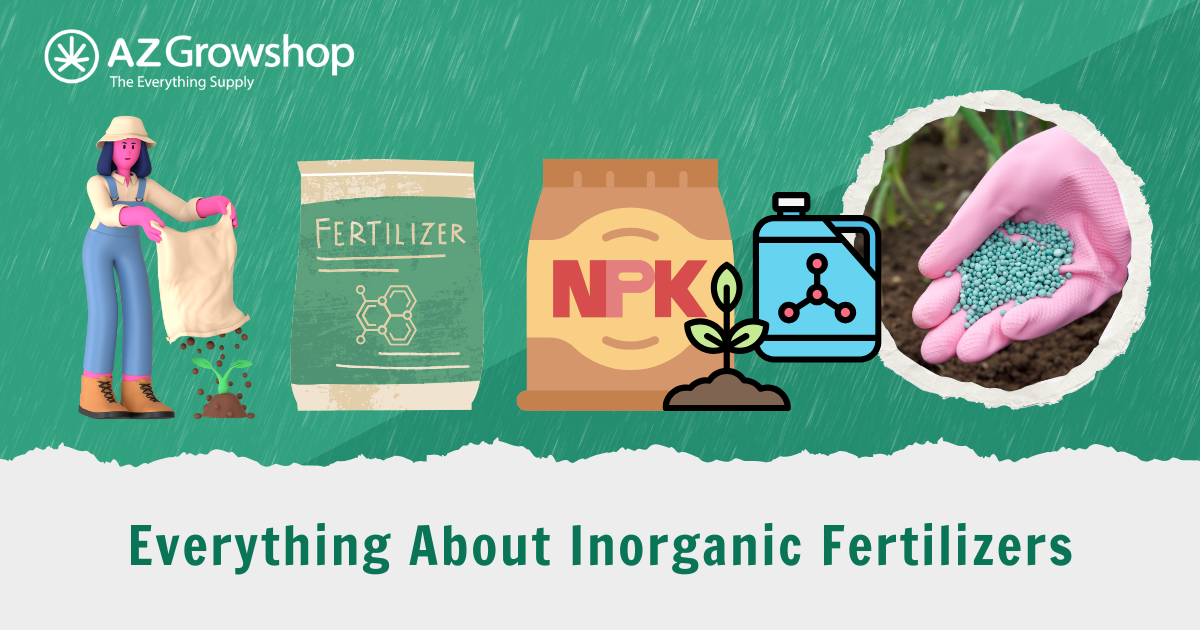Understanding Inorganic Fertilizers
What Is Inorganic Fertilizer?

Inorganic fertilizer, often referred to as synthetic or chemical fertilizer, is a type of plant nutrient derived from mineral deposits or chemically synthesized materials. Unlike organic fertilizers, which are made from natural sources like compost or manure, inorganic fertilizers are formulated to deliver precise amounts of essential nutrients directly to plants. These nutrients—primarily nitrogen (N), phosphorus (P), and potassium (K)—are critical for plant growth and are often listed on fertilizer packaging as the NPK ratio.
History and Development of Inorganic Fertilizers
The invention of inorganic fertilizers revolutionized modern agriculture. Typical example is the Haber-Bosch process in the early 20th century allowed for the large-scale production of ammonia, a key ingredient in nitrogen-based fertilizers. The Haber-Bosch process exemplifies a pivotal innovation in chemical engineering, with extensive implications for agriculture, industry, and environmental sustainability.

These innovations made it possible to produce fertilizers with high nutrient concentrations, enabling farmers to grow more food on less land. Today, inorganic fertilizers play a vital role in feeding a growing global population, supporting food security across the world.
Importance of Inorganic Fertilizers in Agriculture
Inorganic fertilizers are indispensable in modern farming practices due to their ability to enhance crop productivity efficiently. They provide plants with readily available nutrients, promoting faster growth and higher yields compared to organic options. For large-scale agriculture, inorganic fertilizers are a practical solution to meet the demands of high-yield agriculture. Furthermore, they are often tailored to specific crop needs, ensuring that plants receive the right balance of nutrients to thrive.

By understanding the definition, history, and significance of inorganic fertilizers, we can appreciate their impact on agriculture and their potential to meet the challenges of global food production. In the sections that follow, we’ll delve deeper into the types, benefits, and best practices for using these essential agricultural tools.
Types of Inorganic Fertilizers
Classification Based on Nutrient Content
Inorganic fertilizers are categorized primarily by the nutrients they deliver to plants. Each type addresses specific needs, ensuring that crops receive optimal nutrition for growth and yield.
-
Nitrogen-Based Fertilizers
Nitrogen is a fundamental nutrient for plant growth, promoting lush, green foliage and overall vitality. Examples of nitrogen-based inorganic fertilizers include ammonium nitrate, urea, and calcium ammonium nitrate. These fertilizers are widely used in agriculture. -
Phosphorus-Based Fertilizers
Phosphorus is crucial for root development and energy transfer in plants. Popular options include superphosphate, triple superphosphate, and diammonium phosphate (DAP). -
Potassium-Based Fertilizers
Potassium enhances plant resistance to diseases, regulates water uptake, and improves fruit quality. Common potassium fertilizers include muriate of potash (potassium chloride) and sulfate of potash.

Specialty Inorganic Fertilizers
To meet specific agricultural needs, specialty inorganic fertilizers have been developed, providing targeted benefits to plants.
-
Slow-Release Fertilizers
These fertilizers release nutrients gradually over time, reducing the risk of over-fertilization and ensuring long-term nutrient availability. They are particularly useful in horticulture and landscaping. -
Micronutrient Fertilizers
While primary nutrients like nitrogen, phosphorus, and potassium are vital, plants also require micronutrients such as zinc, iron, and manganese. Micronutrient fertilizers are formulated to address deficiencies that could hinder plant health and productivity. -
Foliar Fertilizers
Foliar fertilizer is a liquid nutrient solution applied directly to plant leaves, allowing for quick absorption and efficient delivery of essential nutrients. It is often used to quickly supplement nutrients for plants, correct nutrient deficiencies, and promote healthy plant growth during critical stages.
How Inorganic Fertilizers Work
Mechanism of Nutrient Release
Inorganic fertilizers are designed to deliver nutrients directly to plants in a readily available form, ensuring rapid uptake and immediate benefits. Unlike organic fertilizers that require decomposition, inorganic fertilizers dissolve quickly in water, allowing nutrients like nitrogen, phosphorus, and potassium to be absorbed by plant roots.
-
Solubility and Nutrient Availability
Inorganic fertilizers are highly water-soluble, making them efficient for plant absorption. When applied to soil, the fertilizer dissolves, releasing essential ions that plants can readily take up through their roots. For example, ammonium nitrate provides nitrogen in both ammonium and nitrate forms, catering to different plant uptake preferences. -
Precision and Efficiency
Modern inorganic fertilizers are formulated with precision to meet specific crop demands. Whether it's a high-nitrogen fertilizer for leafy vegetables or a balanced NPK blend for general use, these products ensure that plants receive the exact nutrients they need.

Impact on Plant Growth and Yield
-
Enhanced Root and Shoot Development
Nitrogen in easily accessible form encourages robust shoot growth, resulting in vibrant, green foliage. Meanwhile, phosphorus strengthens root systems, improving the plant's ability to absorb water and nutrients from the soil. This dual impact fosters balanced growth and resilience. -
Improved Flowering and Fruit Production
Potassium is crucial for flowering and fruiting, enhancing the quality and size of the harvest. For crops like tomatoes, potassium-rich fertilizers ensure better fruit development and improved taste. -
Faster Growth Cycles
Inorganic fertilizers provide nutrients in their most accessible form, significantly speeding up plant development. Growth cycles of crops will be reduced significantly, making it possible to harvest multiple times in a single season.
The efficiency and precision of inorganic fertilizers make them indispensable for modern agriculture. By understanding how these fertilizers work, growers can maximize their benefits while reducing cost and environmental impact. In the following section, we’ll delve into the pros and cons of using inorganic fertilizers, providing a balanced perspective on their role in agriculture.
Pros and Cons of Inorganic Fertilizers
Advantages of Inorganic Fertilizers
Inorganic fertilizers are a cornerstone of modern agriculture due to their efficiency, precision, and ability to meet the high demands of production. Here are some key benefits:
-
High Nutrient Concentration
Inorganic fertilizers are formulated with a high concentration of essential nutrients like nitrogen, phosphorus, and potassium. This allows farmers to deliver a significant amount of nutrients with minimal application, making them highly cost-effective for large-scale farming. -
Immediate Results
One of the most notable advantages of inorganic fertilizers is their rapid action. Since these fertilizers dissolve quickly in water, plants can absorb the nutrients almost immediately after application, resulting in visible improvements in growth and health within days. -
Tailored Nutrient Composition
Modern inorganic fertilizers are available in precise NPK ratios to meet the specific needs of different crops. For instance, leafy vegetables thrive with nitrogen-rich formulas, while root crops benefit from phosphorus-dominant blends. -
Ease of Use
Inorganic fertilizers are easy to handle, store, and apply. They can be used in various forms, including granules, powders, and liquid solutions, catering to different farming methods such as drip irrigation and foliar feeding.

Disadvantages of Inorganic Fertilizers
Despite their advantages, inorganic fertilizers pose some challenges, especially when not used responsibly.
-
Soil Degradation
Over-reliance on inorganic fertilizers can lead to soil acidification and nutrient imbalances over time. Continuous use without organic supplementation may deplete the soil of essential micronutrients and reduce its overall fertility. -
Nutrient Leaching and Runoff
The high solubility of inorganic fertilizers increases the risk of nutrient leaching, especially during heavy rains. Excess nutrients, such as nitrates and phosphates, can enter groundwater, causing eutrophication—a process that depletes oxygen and harms aquatic ecosystems. -
Environmental Pollution
The production and excessive use of inorganic fertilizers contribute to greenhouse gas emissions and water contamination. For example, the release of nitrous oxide, a potent greenhouse gas, is associated with nitrogen fertilizer usage. -
Potential Health Risks
High levels of nitrates in water sources, resulting from fertilizer runoff, can pose health risks, including methemoglobinemia or "blue baby syndrome" in infants.
Best Practices for Using Inorganic Fertilizers
Application Techniques for Optimal Results
Proper application of inorganic fertilizers is essential to maximize their benefits and minimize environmental impact. Here are some key techniques:
-
Timing Is Everything
Apply fertilizers at the right growth stage to ensure plants receive nutrients when they need them most. For example: - Nitrogen-based fertilizers are best applied during the vegetative stage to promote leafy growth.
- Phosphorus and potassium should be emphasized during flowering and fruiting stages for stronger roots and better yields.
-
Soil Testing Before Application
Conduct a soil test to identify nutrient deficiencies and determine the exact type and quantity of fertilizer needed. This ensures efficient nutrient delivery and reduces the risk of over-fertilization. -
Avoid Over-Fertilization
Follow the recommended dosage on fertilizer packaging or consult an agricultural expert to prevent nutrient runoff, soil degradation, and plant toxicity.
Combining Inorganic and Organic Fertilizers
A sustainable approach to fertilizer use involves integrating inorganic and organic fertilizers. This method balances rapid nutrient delivery with long-term soil health.
-
Enhancing Soil Structure
Organic materials like compost or manure improve soil texture and water retention. When combined with inorganic fertilizers, they create an ideal growing environment for crops. -
Improving Nutrient Efficiency
Organic matter acts as a slow-release mechanism, complementing the quick action of inorganic fertilizers. This combination minimizes nutrient leaching and maximizes plant uptake. -
Integrated Nutrient Management (INM)
INM is a holistic farming practice that uses both organic and inorganic inputs. It optimizes crop production while maintaining soil fertility and reducing environmental impact.
By adopting these best practices, farmers can unlock the full potential of inorganic fertilizers while safeguarding the environment and preserving soil health. Responsible fertilizer use ensures not only higher crop yields but also long-term agricultural sustainability.
Types of Inorganic Fertilizers Offered by AZ GrowShop
Overview of AZ GrowShop’s Fertilizer Range
AZ GrowShop is a trusted supplier of high-quality inorganic fertilizers designed to meet the diverse needs of growers. Whether you’re cultivating crops in soil or hydroponic systems, AZ GrowShop provides a wide range of products tailored to maximize plant health and yield. Our fertilizers are sourced from globally recognized brands, ensuring both reliability and effectiveness.

Featured Inorganic Fertilizers at AZ GrowShop
-
Established in 1998, Grotek™ is renowned for formulating premium nutrients and supplements tailored for serious growers. Their product line seamlessly blends organic extracts with mineral/inorganic fertilizers, ensuring plants get the essential nutrients they need while minimizing fertilizer runoff. Grotek™ products, such as Heavy Bud Pro, are trusted by growers for producing high-quality, flavorful harvests.
-
House & Garden®
House & Garden® is synonymous with precision and performance. Their inorganic fertilizers are formulated to promote efficient nutrient absorption, maximizing plant health and yields. This meticulous approach results in robust plant development and enhanced crop quality. -
Advanced Nutrients®
Advanced Nutrients® revolutionizes the industry with their pH-perfect organic as well as inorganic fertilizers, ensuring plants absorb maximum nutrients without the need for constant pH adjustments. Their extensive range of nutrients and supplements is designed to enhance plant growth, increase yields, and improve overall plant health. -
FloraFlex®
FloraFlex® offers clean, high-quality inorganic fertilizers tailored for hydroponic systems and soil cultivation. Their powdered nutrients are engineered for efficient nutrient absorption, supporting healthy growth while minimizing waste. With FloraFlex®, you can achieve excellent results while maintaining soil fertility and environmental sustainability. -
CANNA®
CANNA® is a pioneer in producing premium fertilizers and growing mediums that improve soil fertility and support fast-growing plants. Their rigorously tested products ensure optimal nutrient absorption, delivering impressive yields. CANNA® remains a trusted name among growers worldwide.
Why Choose AZ GrowShop for Inorganic Fertilizers?
- Wide Selection: AZ GrowShop stocks fertilizers suitable for all types of cultivation methods, including hydroponics, soil, and outdoor farming.
- Expert Advice: Our team provides personalized recommendations to help you select the perfect product for your plants.
- Convenient Shipping: Products are shipped directly from Bangkok, ensuring fast delivery within the region.
FAQs
What Are the Differences Between Organic and Inorganic Fertilizers?
Organic fertilizers are derived from natural sources like compost, manure, and plant residues, while inorganic fertilizers are chemically synthesized or mined from mineral deposits. Inorganic fertilizers provide immediate nutrients in a precise NPK ratio, whereas organic fertilizers improve soil structure and release nutrients slowly. Both types can complement each other for balanced soil fertility.
How Do I Choose the Right Inorganic Fertilizer for My Crops?
Selecting the right fertilizer depends on your crop’s nutrient requirements and soil condition. Conduct a soil test to determine deficiencies and choose a fertilizer with the appropriate NPK ratio. For instance:
- Nitrogen-rich fertilizers are ideal for leafy greens.
- Phosphorus-heavy products are best for root crops.
- Potassium-based fertilizers enhance fruit development.
AZ GrowShop offers a wide range of high-quality inorganic fertilizers from top brands like Advanced Nutrients, CANNA, and Biobizz, making it easy to find the right product for your specific needs.
Are Inorganic Fertilizers Harmful to Humans?
When used correctly, inorganic fertilizers are safe for humans and the environment. However, improper application can lead to issues like nitrate contamination in drinking water. Always follow recommended guidelines for storage, handling, and application to ensure safety.
Can Inorganic Fertilizers Be Used for All Types of Plants?
Yes, inorganic fertilizers are versatile and can be tailored to suit various plants, including fruits, vegetables, flowers, and grains.
AZ Growshop - The Everything Supply
AZ GrowShop is your trusted partner for all things related to growing from high-quality inorganic/organic fertilizers to growing equipments. With a comprehensive range of products from globally recognized brands like Grotek, House&Garden, Advanced Nutrients , CANNA và Floraflex, we provide tailored solutions to meet the needs of every grower.
Whether you're growing in soil, hydroponics, or outdoor environments, AZ GrowShop ensures your crops get the nutrition they need for optimal growth and yield. Don’t wait—explore our product catalog today and experience the difference. Shop now at AZ GrowShop and take your growing to the next level!




